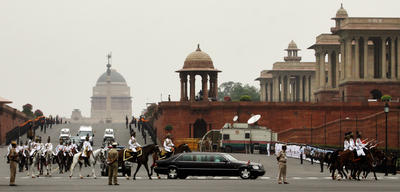Even if this is dismissed as third-world rhetoric from an emerging economic power, now on good terms with the developed world, Mukherjee’s warning on terrorism — calling it the fourth world war — should not be ignored. The president reminded those who instigate violence and perpetuate hatred that a ‘few minutes of peace will achieve far more than many years of war’.
His address also had a message for policy makers, especially economic reformers whose cause he had strongly supported as a minister in the government. ‘Trickle-down theories just do not address the legitimate aspirations of the poor’, he told them, stressing that: ‘There is no humiliation more abusive than hunger’. In an interview with India Today, President Mukherjee also said that India has to improve its performance on health, education and other social indicators.
Rousing and well-timed words, but spoken amid India’s manifest contradictions and a period of political and economic turbulence.
The recent death of Bollywood actor Rajesh Khanna received extensive press coverage. By contrast, Mukherjee’s address was not splashed across the front pages of the country’s national newspapers. This paucity of media attention reflects simmering social tensions and an acute disenchantment with the political class, particularly with the lawmakers who elected Mukherjee.
President Mukherjee had the dubious distinction of being personally attacked on the day he was sworn in by the leaders of an ongoing anti-graft movement and by sections of the media. That the movement itself is at a cross-road with the media changing its tune underlines the contradictions.
Mukherjee has Prime Minister Manmohan Singh for company, who has been personally pilloried for condoning graft and failing to recover funds that were illegally stashed in foreign banks. Mukherjee’s elevation has even been called a ruse to allow him immunity from the law. The accusers have little to show as evidence, however.
Investors are alarmed due to serious slippages in the Indian economy, compounded by a bad monsoon. As India’s finance minister till only a few weeks ago, Mukherjee must share some of the blame for this.
As domestic criticism feeds into perceptions abroad, global media coverage is quickly turning negative. Earlier this year Time magazine called Singh an ‘underachiever’. This resonated loudly with India’s vocal and powerful middle class, to the point that business leader Ratan Tata rushed to defend Singh, hitting out at the opposition, media and ‘some members of [the] ruling party’ for a ‘grossly misdirected’ campaign.
Tata also exhorted Singh to speed up the economic reforms like FDI in retail and reverse the policy drift. Neither Singh, nor Mukherjee earlier, have quick-fix solutions to offer when provincial satraps, some of them within the ruling alliance, are opposing reforms for lack of long-term understanding and out of political expediency.
It not just politics guiding economics; there is jockeying for vantage positions and scoring of political brownie points too.
Mukherjee is the ninth politician, from out of thirteen, to become president. Suddenly, his past is being held against him because many of his predecessors, even non-political ones, favoured the federal government in constitutional disputes with the states and dissolved elected governments that lost majority support in the legislature — the loss at times being engineered by Delhi.
This relates to the never-ending debate on the role of the president vis-à-vis the prime minister. The framers of India’s constitution visualised the presidency as ceremonial and advisory. Mukherjee himself described the post as that of a ‘figurehead’ — a symbolic, rather than an active or interventionist wielder of authority. ‘He will now be expected to conduct himself accordingly’, the Times of India said in its 25 July editorial.
In his speech, Mukherjee also pledged to ‘defend [the] Constitution not just in words’. Critics say that because of his lifelong membership of the Indian National Congress Party, he might favour the ruling party when a new government will be formed after the parliamentary elections in the summer of 2014. The Congress is losing ground in many states and its return to power is thought to be unlikely.
These perceptions may well prove right, but critics are still jumping the gun. The Congress was not the hot favourite in 2004 or in 2009. Elections are still 22 months away and fortunes have altered in the past — even in the fortnight before an election. Nobody can predict how 700 million people will vote.
Having spent decades in government, much of it handling the economy, Mukherjee is well placed to lend an advisory hand to the prime minister, if sought, on how best to tackle the current slowdown. Mukherjee is also bound to engage in diplomacy because businessmen and investors typically accompany the Indian president on foreign tours.
Like Singh, Mukherjee, who offered US$100 million to help the euro zone deal with its credit crunch, will be listened to by the world community.
Mahendra Ved is a New Delhi-based writer and columnist.

